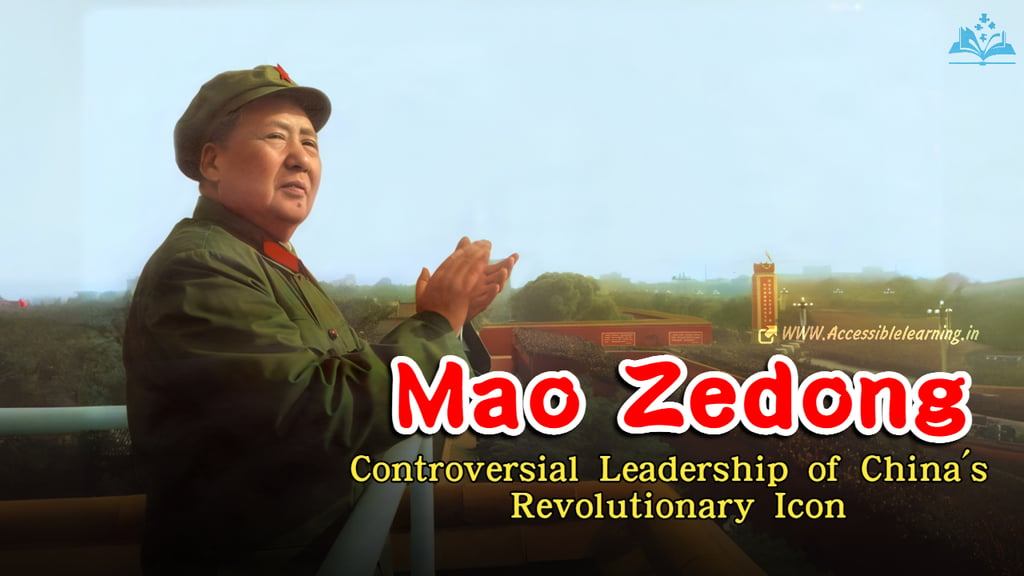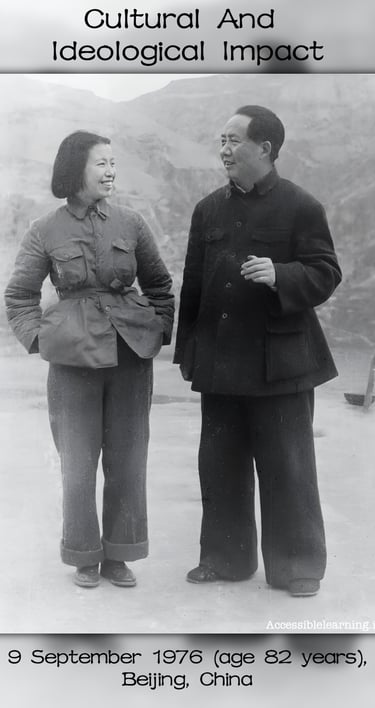
Mao Zedong: The Controversial Leadership of China's Revolutionary Icon!
The life and legacy of China's revolutionary leader Mao Zedong. Learn about his accomplishments, such as unifying China and implementing social reforms, as well as controversial policies such as the Great Leap Forward and the Cultural Revolution. Learn about Mao's impact on modern China and the complex nature of his leadership.
BIOGRAPHY/HISTORYCHINESE HISTORYHISTORY
Kim Shin
9/29/20247 min read


Born on December 26, 1893, in Shaoshan, Hunan province, Mao Zedong (毛澤東) was a towering figure in Chinese history, often seen as both a revolutionary leader who transformed China and a controversial figure responsible for immense suffering. His leadership shaped modern China through his ideology, policies, and revolutionary zeal, but his legacy is very complex, encompassing both progress and pain.
Early Life and Revolutionary Beginnings!
Mao / 模 was born into a peasant family, an experience that shaped his worldview and his deep concern for the plight of China's rural poor. Early in his life, he was deeply influenced by Marxist theory and the Bolshevik Revolution in Russia. By the 1920s, he had joined the Chinese Communist Party (CCP) / 中國共產黨, rising through the ranks to become one of its most influential figures.
Mao believed in the power of the masses, particularly the peasants, in revolution. Unlike traditional Marxist views that prioritized urban workers, Mao saw the potential for revolution in rural China. This ideology led to the rise of the CCP and eventually to Mao's leadership in the establishment of the People's Republic of China (PRC) / 中華人民共和國 in 1949.
The Founding of the People's Republic of China!
On October 1, 1949, Mao declared the founding of the PRC, marking a dramatic change in China's history. His policies aimed to eliminate feudalism, imperialism, and capitalist exploitation while pursuing socialism. The early phase of his leadership saw many ambitious reforms, including land redistribution and the nationalization of industry, which improved the lives of many peasants and helped modernize the economy.
Mao's focus on agricultural reform, promoting education, and improving healthcare brought tangible improvements to the lives of many Chinese citizens / 中國公民. His effort to eliminate foreign influence and restore Chinese pride also deeply impressed the people, establishing him as a hero of Chinese independence and sovereignty.
Mao’s Legacy of Economic and Social Policies!
While Mao’s intentions to reform China were rooted in ideals of equality and self-reliance, the implementation of these policies often led to severe consequences.
The Great Leap Forward
One of Mao's most controversial policies was the Great Leap Forward / 大躍進 (1958–1962), an attempt to rapidly industrialize China and catch up with Western economies. Its focus was community farming and small-scale industrial projects, particularly steel production. However, poor planning, unrealistic targets, and disastrous weather conditions led to widespread famine, resulting in an estimated 15–45 million deaths.
Despite the devastation, Mao remained committed to his vision of a self-reliant China. The Great Leap Forward is often cited as one of the darkest chapters of his leadership, but for Mao, it was a necessary sacrifice in his broader pursuit of revolutionary progress.
The Cultural Revolution
Mao launched the Cultural Revolution 文化大革命 (1966–1976) to reassert his control and free the Communist Party from bourgeois elements. The movement aimed to rekindle the revolutionary spirit by eliminating old customs, ideas, culture, and habits. It empowered radical youth, known as Red Guards, to overthrow institutions, criticize intellectuals, and attack perceived enemies of the state.
However, the Cultural Revolution descended into chaos, leading to widespread persecution, loss of life, and destruction of cultural heritage. Schools and universities were closed, intellectuals were imprisoned, and the country plunged into social turmoil. Millions of people suffered during this period, and the legacy of the Cultural Revolution remains a subject of deep historical reflection in China.

Mao's Journals and Ideology!
Mao was not only a political leader but also a prolific writer and thinker. His "Little Red Book / 小紅書," a collection of his quotes and ideological musings, became a symbol of his leadership and was widely distributed during the Cultural Revolution.
Mao's journals and writings reveal that he was a leader deeply committed to his revolutionary ideals, although at times he was out of touch with the harsh realities faced by the masses. He believed strongly in the Marxist-Leninist principles of class struggle, but his strategies often dismissed practical challenges, leading to considerable hardship for the Chinese people.
The Good Works of Mao Zedong
Despite the tragedies associated with Mao's policies, his role in transforming China cannot be denied. He played a key role in:
Uniting China: Mao ended decades of civil war and dictatorship, unifying China under a single government for the first time since the Qing Dynasty’s collapse / 清朝滅亡.
Social Reforms: He implemented major land reforms that redistributed land from landlords to peasants, empowering the rural population and dismantling the old feudal structure.
Education and Health Care: Mao’s policies led to improvements in literacy rates and access to basic health care in rural areas, particularly through campaigns like the barefoot doctors program.
Restoring National Sovereignty: Under Mao, China regained control of territories like Tibet and worked to resist foreign intervention, especially from Western powers and Japan.
Dark Secrets and controversies
There are also many stories about Mao's leadership that were hidden from the public for decades. These include:
Personal Cult and Power Consolidation: Mao maintained a strict grip on power, often through purges of political rivals. The cult of personality around him left little room for dissent or open criticism.
Human Suffering: The full scale of the human cost of Mao’s policies—such as the Great Leap Forward’s famine and the Cultural Revolution’s violence—only became apparent later, showing a leader willing to sacrifice millions in the name of revolution.
Persecution of Intellectuals: Intellectuals, artists, and even some CCP members were purged or forced into re-education during the Cultural Revolution. Many were killed, tortured, or driven to suicide during this time.


Global Impact and Foreign Relations!
Mao's leadership not only transformed China but also reshaped global geopolitics, especially during the Cold War. Initially, Mao was closely allied with the Soviet Union, as both nations sought to advance communism. However, by the late 1950s, ideological differences and geopolitical rivalry led to the Sino-Soviet split. Mao believed that Nikita Khrushchev's policies of "peaceful coexistence" with the West betrayed Marxist principles, leading to a significant deterioration in relations between the two largest communist powers.
One of the most important moments in Mao's foreign relations was Richard Nixon's visit to China in 1972. It was a key event in Cold War diplomacy, marking the beginning of China's opening up to the West. Mao recognized the importance of normalizing relations with the United States to balance Soviet power and gain a foothold in the international political arena. This move set the stage for future economic reforms under Deng Xiaoping, even though Mao himself remained ideologically rigid until his death.
Under Mao's leadership, China also provided support to various anti-colonial and revolutionary movements in Asia and Africa. Maoist ideology influenced guerrilla movements in countries such as Vietnam, Cambodia, and India, making Mao a symbol of global revolution for many left-wing leaders. However, while Mao sought to inspire revolutionary change around the world, his foreign policy often prioritized China's own geopolitical interests.


Mao’s Legacy: A Polarizing Figure!
Mao Zedong's legacy remains highly controversial. To many Chinese citizens, he is revered as the father of modern China, a leader who helped free the country from imperialism and feudalism. His face still appears on currency, and his mausoleum in Tiananmen Square attracts millions of visitors each year.
Still, to others, Mao is a symbol of totalitarianism and mass suffering. His policies, while ideologically motivated, often led to widespread devastation, loss of life, and the stifling of intellectual and cultural freedom.
Comparative Leadership Analysis
Mao Zedong's leadership can be compared to that of other revolutionary figures such as Lenin, Stalin, and Fidel Castro, though his style and legacy differ in many ways.
Lenin/列列寧 vs. Mao/模模: Both Lenin and Mao, leaders of the Bolshevik Revolution, believed in the revolutionary power of the masses, but their strategies differed. Lenin believed that the urban, industrial revolution would be led by the working class, while Mao saw the rural peasantry as the revolutionary force in China. Lenin's rule was characterized by establishing a vanguard party, while Mao maintained strict personal control over the Chinese Communist Party despite his emphasis on the masses, creating a cult of personality that Lenin actively avoided.
Stalin/史達林 vs. Mao/模: Stalin's totalitarian rule in the Soviet Union influenced Mao's own rule, particularly in terms of purges and political repression. Both leaders presided over mass famines caused by poorly executed policies—Stalin's the Holodomor and Mao's the Great Leap Forward. However, Mao was arguably more ideologically driven, often neglecting practical concerns in favor of revolutionary zeal, as seen in the Cultural Revolution. Stalin, on the other hand, focused more on consolidating power within the Soviet system through fear and terror.
Fidel Castro/ 菲德爾·卡斯特羅 vs. Mao/模: Like Mao, Fidel Castro led a successful Communist revolution in Cuba, but Castro's approach was more pragmatic. While both shared the goal of uplifting the peasantry and challenging foreign (particularly U.S.) influence, Castro's regime was more adaptable, maintaining economic survival through a partnership with the Soviet Union and even adopting limited market reforms in later years. In contrast, Mao opposed any deviation from his ideological path, which led to harsh consequences for China during his time.
Global Impact: Unlike Mao, whose revolutionary policies often resulted in massive internal suffering, Lenin and Castro found varying degrees of success without causing as much damage to their societies. Like Mao 模, Stalin left a controversial legacy, as both leaders are remembered for their purges and famines as well as their achievements in industrialization and military might.
Mao Zedong / 毛澤東 was a complex leader whose actions left an indelible mark on Chinese history. His revolutionary achievements, such as unifying China and pursuing social reforms, are undermined by the immense human cost of his policies. Mao's legacy is one of both nation-building and deep social suffering, and his life continues to inspire debate both within China and globally.
In examining Mao's life and legacy, it is clear that he was a leader driven by ideological commitment, but his approach sometimes came at a heavy price to the people he sought to uplift.
Subscribe To Our Newsletter
All © Copyright reserved by Accessible-Learning Hub
| Terms & Conditions
Knowledge is power. Learn with Us. 📚


